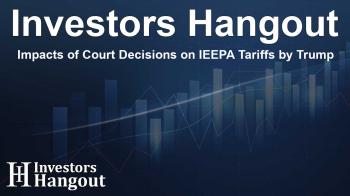Impacts of Court Decisions on IEEPA Tariffs by Trump

Understanding the Current Legal Landscape of Trump's Tariffs
Recent activities in federal appeals courts signal a desire to resolve the ongoing uncertainty surrounding President Trump’s IEEPA tariffs promptly. The Federal Circuit Court of Appeals is gearing up to potentially hear oral arguments en banc, indicating their aim for a swift ruling that minimises the chances of an appeal to the Supreme Court.
At the same time, the District of Columbia Circuit has convened a three-judge panel, all appointed by Trump, to consider another related case. The likelihood of this specific composition arising randomly is remarkably low, about 0.6%. Thus, if the president cannot succeed with this favorably composed panel, the chances of prevailing at the Supreme Court could be slim.
Trump's Legal Challenges Against the Tariffs
Two federal courts have ruled against Trump’s IEEPA tariffs, deeming them unlawful and unconstitutional. Although he’s appealed these decisions, his starting position is precarious, sitting at 0-2. One significant ruling against him was a unanimous 3-0 decision delivered on May 28 by the Court of International Trade (CIT), which specializes in federal trade matters. This ruling not only vacated Trump’s tariffs but also issued a permanent injunction against similar future tariffs.
In an attempt to continue asserting authority over trade agreements, Trump announced numerous deals reliant on the IEEPA tariffs, despite the CIT ruling. Following the court's stance, he led foreign governments to interpret the stay of the ruling as a sign of the court's future decision siding with him.
However, the Federal Circuit might have other intentions. The oral arguments scheduled for July 31 imply urgency, and an unusual en banc review indicates the court's intent for a decisive, quick ruling. Historically, en banc hearings signal that the judges wish for a comprehensive view reflecting the entire bench's sentiments.
The Implications of Federal Circuit Rulings
Interestingly, eight judges on the Federal Circuit were at appointments made by Democratic presidents, while only three were appointed by Republicans, indicating a challenging landscape for Trump. A strong majority ruling in favor of the CIT could produce strong implications, significantly diminishing the likelihood of a successful appeal to the Supreme Court. Moreover, should the Federal Circuit endorse the CIT decision, it would reduce Trump’s chances of obtaining another stay that would permit tariffs to persist.
The Supreme Court generally requires reasonable expectation for reversal when considering a stay. If the Federal Circuit issues a resolute decision, the likelihood of the Supreme Court intervening would decrease dramatically.
With IEEPA tariffs projected to accumulate around $25 billion monthly starting soon, the urgency cannot be understated. Pressure from Trump’s administration for a favorable ruling may influence the dynamics, but the Federal Circuit’s approach could be oriented towards ensuring the Supreme Court avoids retaking this case entirely.
Statistical Analysis of Court Composition
In a stunning turn, the D.C. Circuit Court of Appeals assembled a panel entirely of Trump’s appointees to confront his appeal regarding a ruling that found IEEPA tariffs unconstitutional. This ruling similarly dismissed an administration motion to relocate the case to CIT, where a more favorable outcome was anticipated.
Given that only three judges on the D.C. Circuit were appointed by Trump, we can calculate the odds of this specific panel being assigned. The calculations reveal a staggering 99.4% against such a selection. Ultimately, this phenomenon raises questions about either random panel assignments or potential strategy signaling to Trump regarding the viability of his appeals.
As oral arguments in the D.C. Circuit are slated for September 30, the decisions made by the court could significantly impact the administration’s future attempts regarding tariffs. High-stakes arguments in both courts may determine the fate of these tariffs moving forward.
Frequently Asked Questions
What are the significant outcomes of the Federal Circuit's decisions?
The Federal Circuit’s ruling could either uphold or overturn previous decisions regarding the legality of Trump’s IEEPA tariffs, significantly impacting their continuation or cessation.
How does the panel composition affect the outcome?
The selection of judges can affect the perspectives and interpretations of the law, influencing whether Trump's tariffs will be validated or invalidated.
Are there strategies employed in court appointments?
Yes, the composition of panels can signal strategic considerations, possibly aimed at influencing the outcomes of high-stakes legal debates like these tariffs.
What financial implications could arise from these tariff decisions?
The ongoing legal decisions surrounding the tariffs could result in billions in accumulated costs, ultimately impacting the U.S. economy.
Is there a timeline for the court's decisions on these tariffs?
Yes, oral arguments are set for key dates, with rulings expected soon after, affecting the administration's immediate trade policies.
About The Author
Contact Lucas Young privately here. Or send an email with ATTN: Lucas Young as the subject to contact@investorshangout.com.
About Investors Hangout
Investors Hangout is a leading online stock forum for financial discussion and learning, offering a wide range of free tools and resources. It draws in traders of all levels, who exchange market knowledge, investigate trading tactics, and keep an eye on industry developments in real time. Featuring financial articles, stock message boards, quotes, charts, company profiles, and live news updates. Through cooperative learning and a wealth of informational resources, it helps users from novices creating their first portfolios to experts honing their techniques. Join Investors Hangout today: https://investorshangout.com/
The content of this article is based on factual, publicly available information and does not represent legal, financial, or investment advice. Investors Hangout does not offer financial advice, and the author is not a licensed financial advisor. Consult a qualified advisor before making any financial or investment decisions based on this article. This article should not be considered advice to purchase, sell, or hold any securities or other investments. If any of the material provided here is inaccurate, please contact us for corrections.

